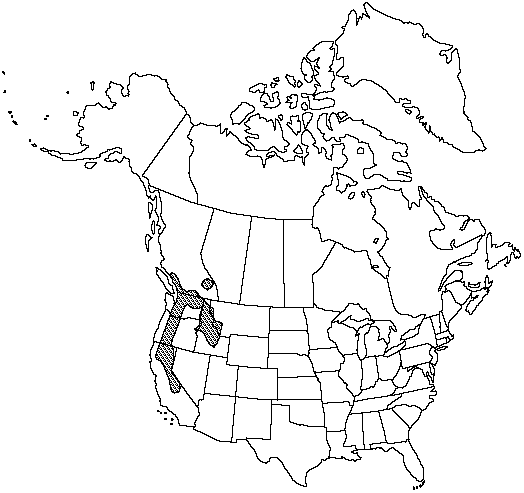Difference between revisions of "Cryptogramma cascadensis"
Amer. Fern J. 79: 95. 1989.
FNA>Volume Importer |
imported>Volume Importer |
||
| (6 intermediate revisions by 2 users not shown) | |||
| Line 8: | Line 8: | ||
}} | }} | ||
|common_names=Cascade parsley fern | |common_names=Cascade parsley fern | ||
| + | |special_status={{Treatment/ID/Special_status | ||
| + | |code=E | ||
| + | |label=Endemic | ||
| + | }} | ||
|basionyms= | |basionyms= | ||
|synonyms= | |synonyms= | ||
| Line 23: | Line 27: | ||
|elevation=900–3500 m | |elevation=900–3500 m | ||
|distribution=B.C.;Calif.;Idaho;Mont.;Oreg.;Wash. | |distribution=B.C.;Calif.;Idaho;Mont.;Oreg.;Wash. | ||
| − | |discussion=<p>Populations of Cryptogramma cascadensis were previously identified as C. acrostichoides.</p> | + | |discussion=<p>Populations of <i>Cryptogramma cascadensis</i> were previously identified as <i>C. acrostichoides</i>.</p> |
|tables= | |tables= | ||
|references= | |references= | ||
| Line 32: | Line 36: | ||
-->{{#Taxon: | -->{{#Taxon: | ||
name=Cryptogramma cascadensis | name=Cryptogramma cascadensis | ||
| − | |||
|authority=E. R. Alverson | |authority=E. R. Alverson | ||
|rank=species | |rank=species | ||
| Line 45: | Line 48: | ||
|publication title=Amer. Fern J. | |publication title=Amer. Fern J. | ||
|publication year=1989 | |publication year=1989 | ||
| − | |special status= | + | |special status=Endemic |
| − | |source xml=https:// | + | |source xml=https://bitbucket.org/aafc-mbb/fna-data-curation/src/2e0870ddd59836b60bcf96646a41e87ea5a5943a/coarse_grained_fna_xml/V2/V2_471.xml |
|genus=Cryptogramma | |genus=Cryptogramma | ||
|species=Cryptogramma cascadensis | |species=Cryptogramma cascadensis | ||
Latest revision as of 20:23, 5 November 2020
Stems decumbent to erect, much branched from base, stout, 4–8 mm diam. (including hardened, persistent leaf bases); scales often bicolored, dense, broadly lanceolate to linear, to 6 × 2 mm. Leaves strongly tufted, deciduous; sterile leaves spreading, 3–20 cm; fertile leaves erect, 5–25 cm; petioles, costae, and costules glabrous. Petiole green to straw-colored, dark brown only on proximal 1/8 or less, ca. 1 mm wide when dry, collapsing and strongly furrowed; scales bicolored or ± concolored, becoming sparse distally. Blade deltate to ovate-lanceolate, all 2–3-pinnate, herbaceous, thin and translucent when dried, hydathodes superficial. Segments of sterile leaves oblong to fan-shaped, bases cuneate, distal 1/2–1/3 of each segment regularly dentate and often more deeply incised every 2d and 4th tooth; segments of fertile leaves ascending to erect, strongly differentiated from those of sterile leaves, linear, 3–12 × 1–2 mm; fertile segments revolute, covering sporangia. Sporangia in sori that coalesce at maturity. 2n = 60.
Habitat: New growth produced in spring, spores maturing in late summer and autumn, leaves dying in autumn. Talus slopes and cliff crevices, often on igneous rocks, typically in relatively mesic subalpine habitats
Elevation: 900–3500 m
Distribution

B.C., Calif., Idaho, Mont., Oreg., Wash.
Discussion
Populations of Cryptogramma cascadensis were previously identified as C. acrostichoides.
Selected References
None.